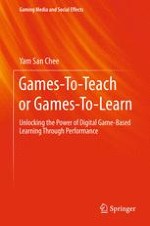2016 | OriginalPaper | Buchkapitel
5. Legends of Alkhimia: Engaging in Scientific Inquiry by Being a Chemist
verfasst von : Yam San Chee
Erschienen in: Games-To-Teach or Games-To-Learn
Verlag: Springer Singapore
Aktivieren Sie unsere intelligente Suche, um passende Fachinhalte oder Patente zu finden.
Wählen Sie Textabschnitte aus um mit Künstlicher Intelligenz passenden Patente zu finden. powered by
Markieren Sie Textabschnitte, um KI-gestützt weitere passende Inhalte zu finden. powered by
